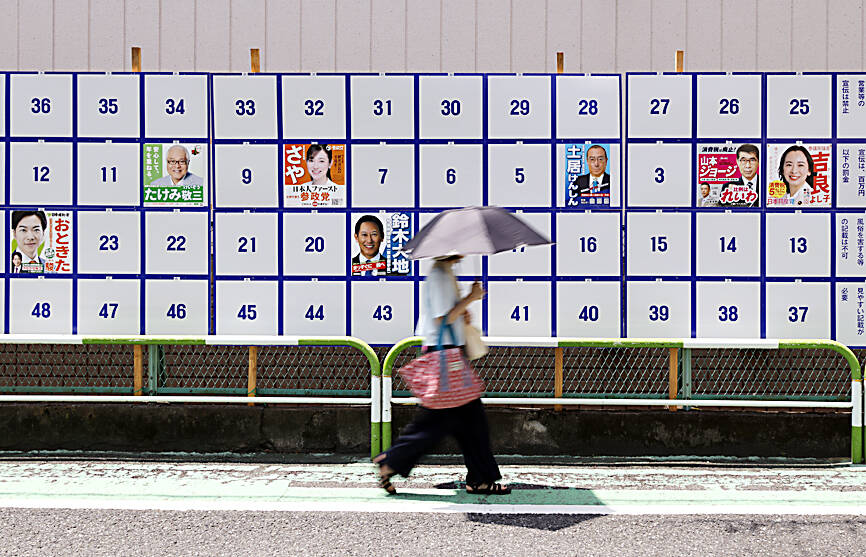Campaigning for Japan’s upper house election started yesterday, with unpopular Japanese Prime Minister Shigeru Ishiba fighting to maintain the ruling coalition’s majority.
Ishiba, 68, has been head of a minority government since October last year, when he led the long-dominant Liberal Democratic Party (LDP) to its worst general election result in years.
The ruling coalition of the LDP and the smaller Komeito party could lose its majority in the upper house, too, on July 20 when 125 of the 248 seats are up for grabs.

Photo: EPA
If that happens, “Ishiba may need to step down, leading to a new LDP party leadership election and a new premiership election,” Doshisha University politics professor Toru Yoshida said.
However, “the opposition bloc ... don’t appear to be willing to align to take office”, he said, adding that “a grand coalition” between the LDP-Komeito bloc and the Constitutional Democratic Party of Japan (CDP) could emerge instead.
Voters are angry about inflation — rice prices have doubled in the past year — and corruption within the LDP. US tariffs are also causing unease among firms.
“We’ll save you from inflation,” CDP leader Yoshihiko Noda promised voters.
“Let’s change Japan, let’s overthrow the Ishiba administration,” Noda said in the southern prefecture of Miyazaki.
The LDP’s ruling coalition, which currently holds 141 upper house seats, needs to win at least 50 of the seats on offer to maintain its majority.
Smaller opposition parties could do well, including the Democratic Party for the People, which wants to cut sales taxes, and the anti-immigration Sanseito with its “Japanese First” slogan.

IDENTITY: A sex extortion scandal involving Thai monks has deeply shaken public trust in the clergy, with 11 monks implicated in financial misconduct Reverence for the saffron-robed Buddhist monkhood is deeply woven into Thai society, but a sex extortion scandal has besmirched the clergy and left the devout questioning their faith. Thai police this week arrested a woman accused of bedding at least 11 monks in breach of their vows of celibacy, before blackmailing them with thousands of secretly taken photos of their trysts. The monks are said to have paid nearly US$12 million, funneled out of their monasteries, funded by donations from laypeople hoping to increase their merit and prospects for reincarnation. The scandal provoked outrage over hypocrisy in the monkhood, concern that their status

Trinidad and Tobago declared a new state of emergency on Friday after authorities accused a criminal network operating in prisons across the country of plotting to kill key government officials and attack public institutions. It is the second state of emergency to be declared in the twin-island republic in a matter of months. In December last year, authorities took similar action, citing concerns about gang violence. That state of emergency lasted until mid-April. Police said that smuggled cellphones enabled those involved in the plot to exchange encrypted messages. Months of intelligence gathering led investigators to believe the targets included senior police officers,

The United States Federal Communications Commission said on Wednesday it plans to adopt rules to bar companies from connecting undersea submarine communication cables to the US that include Chinese technology or equipment. “We have seen submarine cable infrastructure threatened in recent years by foreign adversaries, like China,” FCC Chair Brendan Carr said in a statement. “We are therefore taking action here to guard our submarine cables against foreign adversary ownership, and access as well as cyber and physical threats.” The United States has for years expressed concerns about China’s role in handling network traffic and the potential for espionage. The U.S. has

A disillusioned Japanese electorate feeling the economic pinch goes to the polls today, as a right-wing party promoting a “Japanese first” agenda gains popularity, with fears over foreigners becoming a major election issue. Birthed on YouTube during the COVID-19 pandemic, spreading conspiracy theories about vaccinations and a cabal of global elites, the Sanseito Party has widened its appeal ahead of today’s upper house vote — railing against immigration and dragging rhetoric that was once confined to Japan’s political fringes into the mainstream. Polls show the party might only secure 10 to 15 of the 125 seats up for grabs, but it is